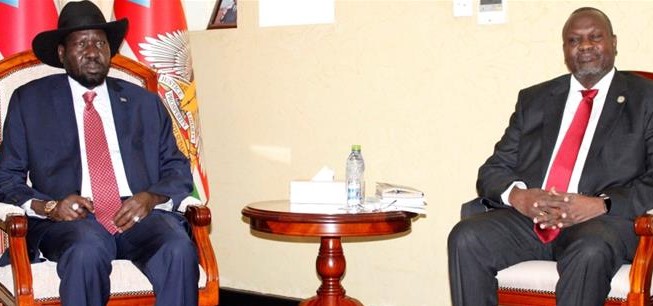On 12 September 2018, South Sudan’s President Salva Kiir signed a power-sharing agreement with opposition leader Riek Machar and several other groups, vowing to bring an end to the five-year conflict that has crippled the country.
The agreement provides for a three-year transitional period, followed by general elections.
It wasn’t the first time for Kiir and Machar to share power. A similar power-sharing deal signed in 2015 collapsed the following year, leading to fighting that prompted Machar to withdraw from the capital Juba.
While fighting largely subsided over the past two years, the implementation of the revitalized peace agreement has been worryingly slow. Disputes between the parties to the peace agreement and financial constraints have been major obstacles to completing the peace process.
The parties to the peace agreement formed the Revitalized Transitional Government of National Unity (RTGoNU) in February. Despite this, there are many unresolved key issues, including security arrangements and an agreement on the finalization of governance structures.
As part of the peace deal, government and opposition forces should form one national army.
On Saturday, reactions among locals towards the revitalized peace agreement were mixed.
"Citizens don’t feel that there is real peace in the country. People are still dying, and prices of commodities are still very expensive in the markets," said James Makoi, a Maridi resident.
According to a recent report released by the United Nations Mission in South Sudan (UNMISS), at least 887 people were killed between April and June across the country.
Last week, UN Secretary-General Antonio Guterres warned that there is a risk of famine and widespread food insecurity in South Sudan and that the lives of millions of people are in danger.
Betty Sunday, a renowned women’s rights activist, said the revitalized peace deal is yet to produce tangible results as violence, human rights abuses and insecurity continue in the country.
"We urge the government to expedite the implementation of the key provisions of the peace agreement, including security arrangements. We want to see the rising cases of violence against women reduced,” she said.
Betty, however, said the revitalized peace agreement provides hope for a return to stability in South Sudan.
The activist called on the unity government to sign a peace agreement with the South Sudan Opposition Movements Alliance (SSOMA), a coalition of parties which did not sign the revitalized peace agreement.
There have been reports of fighting between government troops and forces of the rebel group National Salvation Front led by General Thomas Cirillo in Central Equatoria state.
But Kornelio Kon, a leader of the National Alliance of Political Parties, was more sceptical.
"The implementation of the revitalized peace agreement lacks political will, and there is a lack of trust between the parties. The agreement is facing a lot of challenges," Kornelio Kon said. “Lack of trust between the SPLM and the SPLM-IO could jeopardize the peace agreement.”
Albino Akol Atak, the Other Political Parties (OPP) coordinator, said the parties to the peace agreement are still struggling to finalize governance structures at all levels of government.
He said that the only achievement in the peace agreement was the appointment of a cabinet, nine state governors and three chief administrators.
"Security arrangements were supposed to be completed during the pre-transitional period. But until now, we don’t have a unified army in the country. People are still talking about cantonment areas and graduation of forces,” he said.
"According to my evaluation, we are lagging behind schedule in the implementation of the peace agreement. Honestly, what we are trying to implement now is completely different from what is in the peace agreement,” he concluded.




